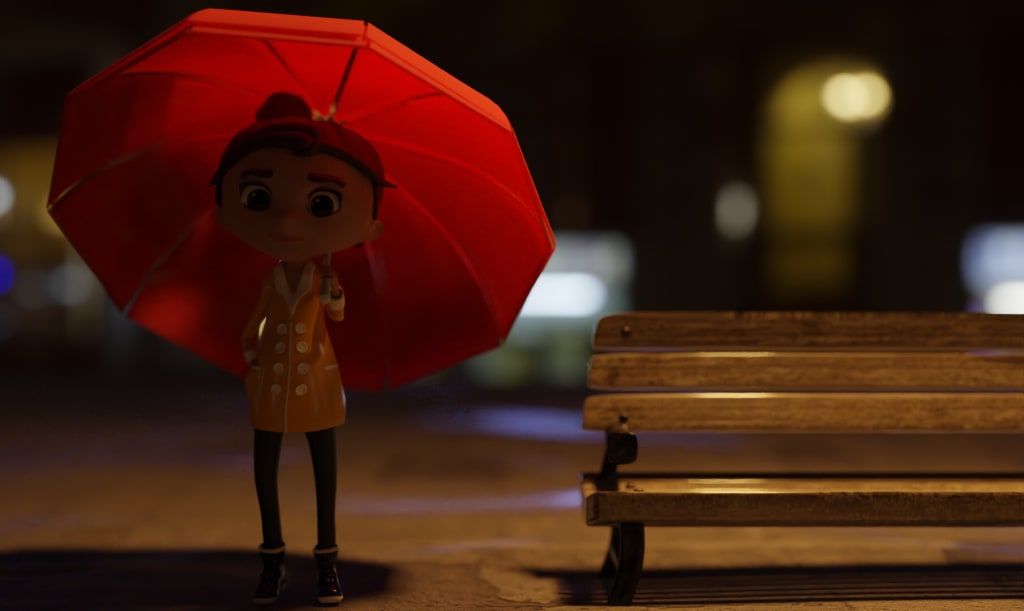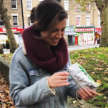A Little Help, A Lot of Love
A Tale of Too Salty

I’m standing in the dark corridor, hesitating, swaying slightly on the spot as I think. There’s a soft, muffled bleep repeating in the distance and the hum of a floor sweeper outside. It’s 2am. The light rain tapping against the window at the end of the corridor blurs the cityscape into refracted fragments of orange, yellow, green, and red. A burst of blue signals the arrival of yet another ambulance in the docking bay below.
*
We have a very sick child down in the Emergency Department. Not an uncommon occurrence at the busy East End hospital where I work, but complicated by the layers of Personal Protective Equipment we now don and doff throughout our ten hour shifts; 12 hours for the nurses. Both our patient and his mother are COVID positive, so we’re all in head-to-toe PPE as we wheel them into the new resuscitation bay, already sweating in the closed cubicle under the bright white lights.
Our patient, not yet in his teens, is overweight and has type 2 diabetes. His COVID infection has triggered a hyperosmolar hyperglycaemic crisis - a potentially fatal syndrome that causes the blood sugar to skyrocket, shifting water and salts away from where they should be and into places they definitely shouldn’t, like the brain. His sodium levels are through the roof and his kidney function is deranged, but we’ve started emergency fluids and he’s stabilised.
My senior registrar - an incredible woman balancing a busy ED job, a family, and a part-time Masters in Trauma Sciences, among other things - has stayed with the patient and his mother in their negative pressure cubicle. I step out, peeling off my PPE and throwing it into the yellow hazard bin, and turn to scrub my hands and arms with soap. The water is freezing and the sink complains loudly as I nudge the tap to the right with my elbow, in an attempt for some warmth. Half a minute later I turn off the tap and wipe the tepid water off my hands with a paper towel, the shrill squealing morphing into a deep rumble as it descends down into the depths of hospital plumbing.
As I walk back to my computer terminal at the far end of the nurses' station our Charge Nurse is phoning the paediatric wards to see if they have the next set of fluids our patient will need soon. He needs a solution with less sodium, but those formulations are rarely used and can be difficult to source in the middle of the night. I put my smartcard back into the reader and log in to the ED system, and see we’ve had no new patients book in. I exhale with relief just as our Charge Nurse puts the phone down with a sigh of frustration. She has fifteen other things to be doing, as well as coordinating her nursing crew, and I swivel on my chair to face her. I only have two patients in the department, and they aren’t due for a review for another hour - I ask her if I can help. She rattles off the numbers and letters of the remaining wards to try, and thanks me, smiling over her shoulder, as she shoots off.
I shimmy my chair over to the empty space she had just occupied and scan the list of numbers we have taped on the desk next to the phone. I punch in the extension. The first number I try rings out, but the second picks up. A kind nurse on the other end listens to my spiel and says she’ll have a look, and a few minutes later the line crackles back to life as she tells me she’s found a bag. My butt’s already off the chair as I thank her profusely and tell her I’ll be up in five minutes. I replace the receiver, whip my smartcard out of the keyboard, and buzz through the double doors towards the main hospital.
It’s a relief to trade the vacuum seal of the FFP3 mask with the lighter surgical mask I need just to walk around the hospital. I meander along the winding underground maze of bright white corridors, crinkling and unwrinkling my nose to work out the kinks left by the FFP3, past the lifts, and into the stairwell. I traipse up the wide staircase, grateful that no one can see I’m heavy-open-mouth-breathing behind my mask.
I swipe out on the 6th and cut left, my footsteps echoing quietly off the high walls as I head down the hallway towards the ward. I notice for the first time that it’s raining outside - the Emergency Department doesn’t have a view. Or windows. I peer through the floor-to-ceiling glass, fogged with condensation, and down onto the street. A car is idling on the corner, but otherwise, it’s quiet. I step away, my eyes drifting downwards. My gaze falls on a small scrap of folded paper lying just off to the side of the walkway.
‘Lists’ are precious things in hospital. We cram notes from the morning rounds, important blood test results, our jobs, and the jobs handed over by our colleagues, around size 9 font detailing the names and locations of the patients we look after. Losing your list isn’t just a big deal because it’s the mother of all to-do lists; it’s a big confidentiality no-no.
I lean down and scoop the piece of paper off the floor. There’s not much information on it; just two names and a ward scribbled across the back. I check the letter next to the names - it’s the ward I’ve just passed. I take a few steps back and peer through the glass in the doors. I can just see a long, dark corridor. I’ll leave it at the nurses' station. Someone usually comes searching if they’ve lost their list, and the nurses' station is usually a good place to start looking. I definitely can’t just leave it on the floor.
I push through the doors into darkness. It’s oddly quiet, and there’s not a person in sight. None of the side-rooms have a light on, and the repetitive bleep of the observation machines seems muffled and far away. I press on down the corridor to the nurses' station. Also empty. Also dark. Bizarre.
There’s a distant orange glow tickling the walls as the corridor loops around a bend to the left ahead of me, a possible sign of life in the vicinity. I tell myself that’s good enough and drop the list onto the nurses' station, turning on my heel, back the way I had come. My side excursion complete, patient confidentiality restored, I march back down the corridor.
I get about half-way there. My weight shifts indecisively from my right foot to my left. I stand in the darkness, hesitating, swaying slightly on the spot as I think. The soft, muffled bleep repeats in the distance and there’s the distinctive hum of a floor sweeper outside. It’s 2am. Blue flashes across the ceiling.
I turn slowly, and then walk briskly back to the desk, having made up my mind. No, it wasn’t quite good enough. Yes, I had technically moved the piece of paper from one unaccompanied stretch of corridor to another. But no, I had not achieved the goal of ensuring the list was in the possession of someone who would either throw it away if it went unclaimed, or help the person find it should they come searching. I pick up the piece of paper and make for the light.
As I come around the bend, the orange glow concentrates over a desk at the far end of the hallway, silhouetting two nurses against the bed board. Getting closer, I start to introduce myself and explain why on earth I’ve just appeared from the darkness when I hear “Laura!”. I cock my head to the side, looking back and forth between the two masked faces gazing up at me, beaming.
The rotations we do as interns are short. You spend 2 years as a junior doctor, doing 4-month rotations in a given specialty before moving onto another - changing floors, wards, sometimes even hospital or city. I’m lucky enough to be a senior house officer in the hospital where I did my first two years as a junior doctor, but we still constantly leave teams behind. And that’s hard. People you see every day, people you rely on in an emergency, people you bring a cup of tea when it’s quiet, or that save you the last biscuit in the pantry. Sometimes there are wonderful things that you bond over together, and sometimes there are terrible things that you grieve over together. There’s usually some cat memes in the mix, too.
Two senior nurses, who looked after me as a fresh-faced, first-year doctor, are sat across from me. We all laugh at the peculiarity of my sudden, unexpected appearance in the middle of the night. I give them a brief account of my mission to bring home the 0.45% sodium chloride solution from the ward around the corner and my encounter with the list. It feels like we worked together a lifetime ago - before we spent our long days and nights in PPE - but their eyes are just as kind over their masks. They tell me their department moved floors to make space for a COVID ward upstairs, and they ask me where I’m working now - I tell them down in the Paediatric Emergency Department. I ask them how they’ve been. We talk about how things have changed. They’ll keep an eye out for the owner of The List for me.
It’s only brief. A small, but not insignificant interaction; a chance encounter I feel lucky to have had. A reminder that even though a lot of things have changed, some have stayed the same. Of why the little things are important.
*
“That was quick!”, the Charge Nurse tells me as I buzz back through the double doors. I hold up the bag of our precious, lightly salted solution, and she cheers.
**
Some small details in this story have been altered or withheld to maintain confidentiality.






Comments
There are no comments for this story
Be the first to respond and start the conversation.